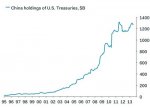Global banks issue alerts on China carry trade as Fed tightens and yuan falls
........
Three of the world's largest banks have warned that the flood of "hot money" into China is at risk of sudden reversal as the yuan weakens and the US Federal Reserve brings forward plans to raise interest rates, with major implications for global finance.
A new report by Citigroup told clients to brace for a second phase of the "taper tantrum" that rocked emerging markets last year, but this time with China at the eye of the storm.
“There’s a dangerous scenario in which the combination of rising US short-term rates and a more volatile RMB (yuan) could lead to a rather large capital outflow from China,” said the report, by Guillermo Mondino and David Lubin.
They argue that China's credit boom has become a "function" of external dollar funding, mostly through offshore lending in Hong Kong and Singapore to circumvent internal curbs. It is a powerful side-effect of super-loose policies by the Fed, which the Chinese have been unable to control. If so, this may snap back abruptly as dollar liquidity dries up and fickle money returns to the US.
Bank lending to emerging markets has surged by $1.2 trillion (£720bn) over the last five years to $3.5 trillion. The banks have funded most of these loans from short-term sources, leaving the whole nexus extremely vulnerable as the US prepares to tighten. The Fed caught markets badly off guard earlier this month when it suggested that interest rates would jump from near-zero to 1pc next year and 2.25pc the year after, a much faster pace than expected.
Half of this foreign lending is linked to China, where dollar loans have jumped by $620bn since 2009. Roughly 80pc are at maturities of less than one year. The report warned that higher rates might “erode bank’s willingness to roll over their cross-border loans to borrowers in China”.
Speculators have been borrowing dollars to buy Chinese assets, a flow known as the "carry trade". They often do so with leverage and through convoluted means, some involving use of copper or iron ore as collateral. The bet is that the yuan will strengthen, generating a near certain profit on the exchange rate. This has gone badly wrong as the central bank intervenes to force down the exchange rate, causing the yuan to fall 2.5pc against the dollar since January.
Nomura issued a client note on Friday warning that the carry trade is “reversing gear”, describing a break-down of discipline in which almost everybody in China from investors, to manufacturers, exporters, and commercial banks have been playing the game. Most of the borrowing has been in dollars and yen on the Hong Kong market.
Wendy Liu, Nomura’s China strategist, said investors are putting too much hope in the promise of fresh stimulus and infrastructure spending, ignoring the risks of a weak yuan.
She said devaluation is a double-edged sword. It helps cushion the shock of China’s economic slowdown, boosting “the razor-thin margins” on exporters along the Eastern seaboard. It may also mitigate the “coming wave of credit defaults”. But is also exposes the fragility of the system. A view is gaining credence that the weak yuan is an early warning sign that “China's credit bubble may implode imminently”, she said.
The Bank for International Settlements caught the attention of central banks across the world -- especially the Bank of England -- with a report last October warning that foreign loans to China are now large enough to risk a repeat of the 1998 financial crisis in Asia.
“They have more than tripled in four years, rising from $270bn to a conservatively estimated $880bn in March 2013. Foreign currency credit may give rise to substantial financial stability risks associated with dollar funding,” it said. Analysts say dollar loans -- to firms, not the Chinese state -- have since risen to $1.2 trillion. Almost a quarter come from British-based banks. The BIS said the loan-to-deposit ratio for foreign currencies in China has doubled from 100pc in 2005 to 200pc today. Much of this has been through foreign exchange swaps and forms of credit that are hard to track.
....
Credit Suisse says HSBC is heavily exposed, generating a large chunk of its profits from trades linked to China. The Swiss bank says the speculative part of the carry trade has reached $200bn and entails an intricate web of manoeuvres through Hong Kong. “Various indicators point to stress in the system. The risk of a mis-step is increasing,” it said.

